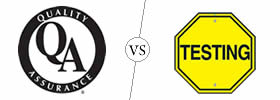Difference between Public and Private Company
Key Difference: The companies can be differentiated on the basis of power to offer their securities to the general public. A company who is permitted to sale the securities to general public is referred to as a public company or a public traded company. On the other hand, a company who does not sale its securities to general public is referred to as a private company. Unlike public company, private company’s stock is not traded on any exchange.
 Public company is a company which is not restricted to sale its securities to general public. It can also refer to a company which can trade its share on a stock exchange. Such a company is also known as public limited company. A company must have a few years of operating history before thinking to become a public company.
Public company is a company which is not restricted to sale its securities to general public. It can also refer to a company which can trade its share on a stock exchange. Such a company is also known as public limited company. A company must have a few years of operating history before thinking to become a public company.
It provides an opportunity to the investors to assess the track record of the company and invest in it. The actual owners of public company are its shareholders. One of the biggest advantages of such a company is that it is quick to raise large sum of money for a public company. However, the original shareholders risk to lose the control of business if the shares are purchased at a very large quantity as part of a ‘take-over bid’. A company needs to fulfill certain mandatory requirements in order to get registered as a public company. These requirements include points like a higher minimum authorized share capital, and higher number of directors and shareholders.
Private company is the one which do not sale its securities to general public. These companies are the ones which get their initial investments from individuals and venture capital firms. Many private companies opt to become public after reaching a certain size and stage.
Private companies do not hold any obligations like revealing the financial situation of the company. The management of the private company decides on the information to be made public. However, a public company needs to be more transparent for revealing details related to revenues, expenses, risk factors, etc.
Private companies are more vulnerable to market risk. At crucial difficult time, private companies do not get the support of public equity and debt market as provided to the public companies. Public companies easily attract debt and equity capital as they are carefully examined by the online reporting services, buyers, security analysts, etc.
Private and public companies have their own sets of advantages. Public companies enjoy the low cost of raising capital, whereas private companies enjoy the benefit of not being answerable to stockholders. Public companies may also opt to become private by having the owners buy back shares from the shareholders.
Comparison between Diagnosis and Treatment:
|
|
Public Company |
Private Company |
|
Definition |
A company who is permitted to sale the securities to general public is referred to as a public company or a public traded company |
A company who does not sale its securities to general public is referred to as a private company |
|
Legal requirements |
Stricter for a public company |
Less stricter for a private company |
|
Size and infrastructure |
Generally, bigger than private companies |
Generally, smaller than public companies |
|
Power of decision making |
Typically, original investors own minority share, and therefore lack the power to make important decisions for the company. |
Typically, the buyer purchases the majority interest in the company, and therefore gets the power to make major decisions |
|
Transferability of shares |
No restriction on the transfer of shares |
A private company bears some restrictions |
|
Research |
Comparatively easy to research than private companies |
Comparatively difficult to research than public companies |
|
Valuation of the company |
Less challenging |
More challenging |
Image Courtesy: onyxmd.com









Add new comment